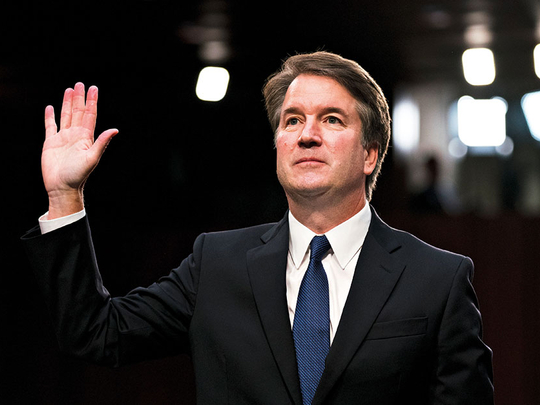
Washington: President Donald Trump’s bid to confirm Judge Brett M. Kavanaugh to the Supreme Court was thrown into uncertainty on Sunday as a woman came forward with explosive allegations that Kavanaugh sexually assaulted her when they were teenagers more than three decades ago.
The woman, Christine Blasey Ford, 51, a research psychologist at Palo Alto University in Northern California, said in an interview with The Washington Post that during a high school party in the early 1980s, a drunken Kavanaugh pinned her on a bed, groped her and covered her mouth to keep her from screaming.
“I thought he might inadvertently kill me,” the newspaper quoted her as saying. “He was trying to attack me and remove my clothing.”
Kavanaugh has denied the accusations, and in a terse statement on Sunday, the White House stood by those denials. It signalled that it had no intention of pulling the nomination.
But Ford’s decision to put her name behind accusations that began to circulate late last week — a choice made after weeks of reluctance — appeared to open a door to a delay in a Senate committee vote on the nomination scheduled for Thursday. The disclosure also injected a volatile #MeToo element into the confirmation debate, one that is playing out in the overwhelmingly male Republican-led Senate during a midterm election that has energised Democratic women.
One Republican on the Senate Judiciary Committee, Senator Jeff Flake of Arizona, told Politico that he was “not comfortable voting yes” on the nomination until he learnt more about Ford’s account. A single Republican objection on the committee, which has 11 Republicans and 10 Democrats, could force a delay.
Another Republican on the panel, Sen. Lindsey Graham of South Carolina, said on Twitter that “if Ms Ford wishes to provide information to the committee, I would gladly listen to what she has to say and compare that against all other information we have received about Judge Kavanaugh.” But he said he hoped to keep the process on schedule. Senator Bob Corker, a Republican, made a similar statement to Politico.
Ford’s account comes as Democrats are already raising questions about Kavanaugh’s truthfulness during his confirmation hearings this month. They have accused him of dissembling on a range of issues from his time in the George W. Bush White House, including a breach of secret Democratic files on judicial nominations and discussions about detainee policy and torture.
The new revelation prompted a hurried effort by Republican Sen. Charles E. Grassley, the Judiciary Committee chairman, to set up conference calls to allow Democratic and Republican aides to interview both Kavanaugh and Ford before Thursday’s scheduled committee vote. A spokesman, Garrett Ventry, said it was routine to hold such calls “when updates are made to nominees’ background files.”
Senate Republican leaders in the hours after The Post’s article was published indicated that they intended to move forward with voting on him. Republicans planned to argue that unless corroborating information came to light, they had no way of verifying her story and saw no reason to delay the vote, according to a person involved in the discussions.
The decision about any delay in the vote could rest on the opinions of two Republican women: Senators Lisa Murkowski of Alaska and Susan Collins of Maine. Both are publicly undecided about Kavanaugh.
Collins said in an interview on Sunday night that she considered the allegations serious and that Ford needed to be personally interviewed to get a fuller account. But Collins, who could conceivably decide the outcome in the narrowly divided Senate, said Democrats had done a disservice to both Ford and Kavanaugh with their handling of the accusations.
“What is puzzling to me is the Democrats, by not bringing this out earlier, after having had this information for more than six weeks, have managed to cast a cloud of doubt on both the professor and the judge,” she said. “If they believed Professor Ford, why didn’t they surface this information earlier so that he could be questioned about it? And if they didn’t believe her and chose to withhold the information, why did they decide at the eleventh hour to release it? It is really not fair to either of them the way it is was handled.”
The White House, which has taken great pains to portray Kavanaugh as a champion of women, sought to bolster him by pointing to statements by women who have known him and testified to his character. Those included a letter from 65 women who said that they knew him in high school and that he had “always treated women with decency and respect.”
Advisers to Trump were trying to avoid publicly assailing the accuser while hoping that the lack of contemporaneous corroboration for Ford’s account would mean that Senate Republicans could move ahead without addressing it in detail.
More delicately, advisers were privately urging Trump, who has been accused of sexual harassment by more than a dozen women, not to speak out about the allegations against Kavanaugh on Twitter for fear that he would only inflame the situation.
Still, some of the president’s allies on the right excoriated Ford — a registered Democrat — as a partisan. But Democrats and their liberal allies rallied around her, praising her courage and deeming her allegations credible.
Senator Dianne Feinstein of California, the top Democrat on the Judiciary Committee, called the accusations “extremely serious” and said they “bear heavily on Judge Kavanaugh’s character.” She urged critics of his accuser to stop “the attacks and stop shaming her.”
Democrat Senator Patty Murray, went one step further, invoking Anita Hill, who came forward during Justice Clarence Thomas’ 1991 confirmation hearings to accuse him of sexual harassment.
“I was motivated to run for the Senate after watching the truly awful way Anita Hill was treated by an all-male Judiciary Committee interrogating her about the sexual harassment she endured at the hands of now-Justice Clarence Thomas,” Murray said in a statement, adding that the hearings must be delayed.
There is an important difference between the two cases, however: Hill detailed harassment that took place in the workplace, when she and Thomas were adults.
The Post’s article included an interview with Ford’s husband and her lawyer, Debra Katz, and described a therapist’s notes from 2012 in which Ford told of the attack. At Katz’s urging, Ford also underwent a polygraph examination in early August; the retired FBI agent who conducted the examination, Jerry Hanafin, said in an interview Sunday that the results showed “no deception indicated” — in effect, “she was being truthful.”
Her account has also been detailed in a confidential letter that Feinstein has shared with the FBI. She disclosed its existence Thursday, although she had been in possession of it at least since late July.












